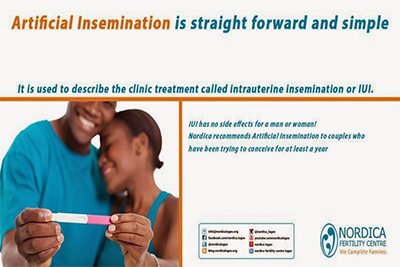What Is Artificial Insemination And Is It Right For You?
What Is Artificial Insemination And Is It Right For You?

Artificial insemination is commonly used to describe the clinical treatment called Intrauterine Insemination or IUI. The procedure is relatively straightforward, simple and can be performed in our clinic.
- First, an ultrasound is used to gauge the size of ovarian follicles which develop into eggs. A hormone called Human Chorionic Gonadotropin is given to the woman to prompt the release of eggs.
- Next, the man’s semen sample is treated in a laboratory where the semen is separated from the seminal fluid. Doing this maximizes the number of sperm which are available to fertilize the egg.
- Finally, a catheter is inserted into the woman’s uterus where it deposits the “washed” sperm. The process is intended to make it easier for an egg to be fertilized since the sperm doesn’t have to travel as far to reach it.
IUI poses no side effects for the man or woman, but she may experience some mild cramping or spotting following the procedure.
Who should consider artificial insemination?
Artificial insemination is usually recommended to couples who have been trying to conceive for at least a year. Clinical conditions that may warrant IUI at a fertility clinic Nordica Fertility Centre may include:
- Unexplained infertility
- Low sperm count
- Decreased sperm mobility
- Use of a donor sperm
- A cervical condition, such as thick cervical mucus
- Cervical scar tissue from past procedures or endometriosis
- Ejaculation dysfunction
Women under the age of 35 have higher success rates than older women. Even so, the overall success rate is between 10-20 percent with one cycle. IUI can be repeated each month when a woman ovulates.
While women don’t have to take medication to prompt ovulation in preparation for IUI, doctors may recommend a prescription treatment to boost egg production. In some cases, fertility drugs can help improve the chances of conception through artificial insemination.



